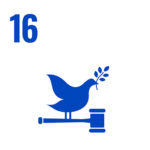GOAL 17: Partnerships for the Goals

To successfully implement the 17 Sustainable Development Goals (SDGs), a comprehensive financing base is needed that goes beyond official development assistance. In addition to public and private funds, politics should also make a greater contribution to achieving the goals. In Goal 17, the developed countries renew their commitment to spend 0.7 percent of their gross national income on official development assistance. In order to reduce dependence on foreign support, the mobilisation of domestic resources is to be strengthened. International cooperation in the field of science, technology and innovation is to be strengthened and an equitable multilateral trading system promoted.
What is to be achieved?
In the area of financing:
- Strengthen domestic resource mobilisation, including through international support to developing countries to improve national capacity to collect taxes and other levies.
- Ensure that developed countries fully meet their ODA commitments, including the commitment made by many developed countries to reach the target of 0.7 per cent of their gross national income for ODA to developing countries and 0.15 to 0.20 per cent to least developed countries; ODA donors are encouraged to consider providing at least 0.20 per cent of their gross national income to least developed countries as a target.
- Mobilise additional financial resources from various sources for developing countries.
- Help developing countries achieve long-term debt sustainability through coordinated policies to promote debt financing, debt relief and debt restructuring, respectively, and address the problem of external indebtedness of heavily indebted poor countries to reduce over-indebtedness.
- Adopt and implement investment promotion schemes, for the least developed countries.
In the field of technology:
- Enhance regional and international North-South and South-South cooperation and triangular cooperation in the field of science, technology and innovation and access to them, and strengthen the exchange of knowledge on mutually agreed terms, including through better coordination between existing mechanisms, particularly at the United Nations level, and through a global mechanism for technology promotion.
- Promote the development, transfer, diffusion, and dissemination of environmentally sound technologies to developing countries on mutually agreed favourable terms, including concessional and preferential terms.
- Fully operationalise the Technology Bank and the Science, Technology, and Innovation Capacity Building Mechanism for Least Developed Countries by 2017 and enhance the use of enabling technologies, in particular information and communication technologies.
On capacity building:
- Strengthen international support for the implementation of effective and targeted capacity-building in developing countries to sup-port national plans to implement all the Sustainable Development Goals, namely through North-South and South-South cooperation and triangular cooperation.
In the area of trade:
- Promote a universal, rules-based, open, non-discriminatory, and equitable multilateral trading system under the umbrella of the World Trade Organisation, notably by concluding negotiations under its Doha Development Agenda.
- Significantly increase developing countries’ exports, with a view to doubling the share of least developed countries in global exports by 2020.
- Achieve the rapid implementation of duty-free and quota-free market access on a permanent basis for all least developed countries in line with World Trade Organisation decisions, including by ensuring that preferential rules of origin applicable to imports from least developed countries are transparent, simple and help facilitate market access.
On systemic issues | Policy and institutional coherence:
- Improve global macroeconomic stability, namely through policy coordination and policy coherence.
- Improve policy coherence in favour of sustainable development.
- Respect each country’s policy space and leadership in defining and implementing policies for poverty eradication and sustainable development.
- Strengthen the Global Partnership for Sustainable Development, complemented by multi-actor partnerships to mobilise and share knowledge, expertise, technology, and financial resources to support the achievement of the Sustainable Development Goals (SDGs) in all countries, particularly developing countries.
- Support and promote the formation of effective public, public-private and civil society partnerships, building on the experience and fundraising strategies of existing partnerships.
- By 2020, increase capacity-building support to developing countries, namely least developed countries and small island developing States, with the aim of having significantly more high-quality, timely and reliable data disaggregated by income, gender, age, race, ethnicity, migration status, disability, geographic location and other characteristics relevant in the national context.
By 2030, build on existing initiatives to develop measures of progress for sustainable development that complement gross domestic product and support statistical capacity building of developing countries.


